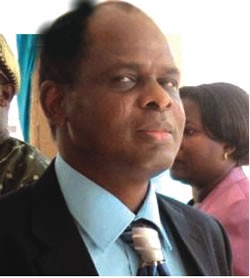
In this interview with MOTUNRAYO JOEL, the Vice-Chancellor, Caleb University, Lagos, Prof. Ayodeji Olukoju, says concentration of youth in entertainment industry is counter-productive
How can our boarding schools be protected from insurgent attacks like the one that happened in Yobe, where pupils were murdered?
It may not be possible to protect all soft targets like schools because there will always be a vulnerable point that the terrorists would like to target, which is what they are best at doing. But in practical terms, perimeter fencing of the entire compound and a cordon around the residential areas will help. Close-circuit television, vigilant monitoring and patrols, careful selection of security personnel (to forestall infiltration and insider collusion) and restriction of movement will also reduce the possibility of such barbaric attacks. Security experts too should fill the gaps in the operational dimensions to counter the insurgents’ critical advantages – surprise, stealth and sophisticated weaponry. Above all, superior intelligence should anticipate likely targets and alert of suspicious activities of any body around such sensitive places
What is your reaction to the strike action by the Academic Staff Union of Universities?
I am in a rather difficult situation as I am a member of ASUU, since I am still a Professor at the University of Lagos, from which I am currently away on leave of absence. I am also the vice chancellor of a private university, which potentially benefits from the crisis. Parents will like their children to attend institutions that operate a stable academic calendar without the too frequent disruptions occasioned by strike actions which is a sign of poor management of labour relations, being a last resort when dialogue has failed or one or both parties have become intransigent. My position is that issues already agreed should be implemented and a wholesale overhaul of the (public) university system is overdue. I do not subscribe to a “one-cap-fits-all” approach where all public universities are treated the same way, regardless of the age, resources and niche of those institutions. I prefer a system that permits the emergence of some mega universities that will rank among the best in Africa, and then the world, according to an agreed time frame. This means that some universities will be more or less teaching universities, while others will function as research universities, with minimal undergraduate programmes. Nigeria needs at least five world-class universities. Universities too should develop flagship programmes, meaning we should concentrate, rather than disperse, our best brains in particular fields and create the proper ambience for them to compete with the world.
Over time, private universities have been criticised for charging exorbitant tuition fees. Why is this so?
Speaking for Caleb University, I can boldly declare that what we charge for both tuition and accommodation is lowerthan what many private secondary schools charge. This is easily verifiable. Secondly, our fees have remained the same since 2008. This means that we have done far better than the government which has raised the pump price of fuel many times since 2008. On a different note, I will assert that those who make the claim that private universities are expensive should relate the fees charged by private universities to the well-known cost of educating an undergraduate in any particular field of endeavour. I am referring to the difference between laboratory/studio- based courses and others. On that score, I do not think that the fees are outrageous. It is also a buyer’s market and nobody is being forced to patronise the so-called expensive universities.
Will you agree to the claim that the country’s labour market focuses more on certificates rather than experience?
I cannot make a categorical pronouncement on this. What I know is that both certification and experience are required at different levels and in different spheres of the economy. To despise certificates is to create an unenlightened workforce, and to discount experience is to have an immature and an incompetent labour force. But how does one have experience without being given a chance to perform in the first instance? In terms of the weight we attach to certificates, I share the concern that this might be excessive, especially when too much emphasis is placed on the class or source of degree. Let me clarify this. I know some outstanding scholars, who attained full professorship, though they obtained a Second Class Lower degree and I have known a few under-performing graduates who have First Class. I did not make a Second Class degree and I am not making a case for lowering standards. The point is that we must not despise those who did not make First Class and we also need to subject all degrees from all sources to rigorous tests before we make any pronouncement. For example, there is no point giving privileges to products of foreign universities, as seems to be the practice in some private sector establishments.
Do we give enough attention to vocational studies?
We are not doing enough in this area. I concur that it is the neglect of vocational education that accounts for a major deficit in our curriculum and in the quality of our products. We need to equip products of our secondary and tertiary institutions with skills for life. This is in view of the fact that we cannot have sufficient white collar jobs for everyone and no economy can thrive without blue collar jobs. The point is that we need to combine literary and technical education to create rounded workers.
Is the education sector well-funded and how much should be allocated?
It all depends on what level and source of funding we are talking about. It is not simply a matter of figures or percentages. At the tertiary level, government has a key role in developing the capacity of its people to make them globally competitive. A country is as good as its education sector and that sector is as good as its products. Funding does not have to be purely financial and it is not only government’s business; much of it can be in the form of donation of buildings and equipment, endowment of professorial chairs and so on. The private sector, local and international funding agencies can support research, equipment procurement, student and staff exchanges.
Are our university courses comparable with those of other universities in developed countries?
Yes, of course. That is why our products do well in foreign institutions; our products not only have talent, but grit and sheer determination. When they get to places where they are spared the existential inconveniences that hobble productivity, they always excel. But the point is that our universities gave them something here to work with over there, in the first instance.
Do you think there should be an age-restriction for university admission?
It all depends on what each institution sets as its benchmarks. Those rejected on account of age restrictions can go to other institutions, especially National Open University of Nigeria, which has no age restrictions. It is a free world.
With more youths going into entertainment industry, what will be the impact on the nation?
It will erode the future of the nation and promote false values. This is a fad that is copied from countries that have already achieved greatness in industry, science and technology. The undue focus of our youth on entertainment, admittedly a legitimate and profitable industry, is myopic and ultimately counter-productive. It is putting the cart before the horse. We may end up producing a generation that is crammed into one narrow sector of the socio-economy, with very weak or limited integration or linkages with the wider economy; a kind of mono-cultural economy, like what over-dependence on crude oil is now, which will also pass away.
What new developments do you plan to execute in Caleb University?
We are developing new programmes in the College of Environmental Sciences and Management, and the College of Social and Management Sciences. We are perfecting an important partnership with the University of Birmingham, which will cover several areas of our need, especially human capacity development. Our postgraduate programmes are being expanded to accommodate courses other than architecture. We are currently expanding our hostel accommodation, adding four new blocks to cater for new students at both undergraduate and postgraduate levels. Our beautification and landscaping is nearing completion.



